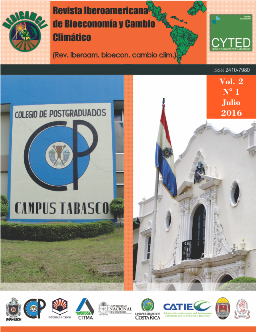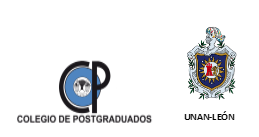Flora arbórea y usos en la cuenca baja del Río Tonalá, Tabasco, México.
DOI:
https://doi.org/10.5377/ribcc.v2i1.5675Palabras clave:
Maderable, Río Tonalá, TabascoResumen
El presente trabajo se realizó en la cuenca baja del río Tonalá, en los municipios de Cardenas y Huimanguillo, Tabasco, México, con el objetivo de inventariar las especies arbóreas presentes en las localidades de La Venta, Villa Benito Juárez, Paylebot, Cuautemoczin y el Yucateco. Se realizaron entrevistasa los copreros, ganaderos, tasisteros, carboneros,mangleros y carpinteros. Se registro la presencia de 58 especies y 54 géneros, agrupadas en 26 familias botánicas. Las familias más frecuentes fueron Fabaceae, Arecaceae, Moraceae, Anacardiaceae, Combretaceae y Sapindaceae. se registro que el 33% de las especies se desarrollan en áreas inundables y 67% en áreas parcialmente inundadas. Los usos más comunes de estas especies son: combustible, para construcción (cimbra), mango de herramientas, muebles, carpintería, postes, cercos vivos, alimento, medicina y otros. El mangle rojo, se emplea en la construcción de casas, elaboración de carbón, leña y artesanías. La madera del estípite del coco se emplea para la elaboración de muebles, bases para macetas y figuras artesanales; con la copra molida se elabora cocoa y chocolates. Las frondas de las palmas de guano largo se utilizan para el techado de casas, trojes y graneros. El tasiste se emplea para cercos, postes, graneros y en la elaboración de mesas, sillas, camas, comedores entre otros.De la flora registrada Avicennia germinans L., Calophyllum brasiliense Camb., Laguncularia racemosa (L). Gaertn., Rhizophora mangle L., Roystonea regia H.B.K. y Spondias radlkoferi Donn. Smith, son especies amenazadas de acuerdo ala NOM-059-ECOL-2010.Descargas
1546
HTML 0
Publicado
Cómo citar
Número
Sección
Categorías
Licencia
Derechos de autor 2016 Rev. iberoam. bioecon. cambio clim.

Esta obra está bajo una licencia internacional Creative Commons Atribución-NoComercial-CompartirIgual 4.0.
Copyright © Rev. iberoam. bioecon. cambio clim. (Colegio Postgraduados y UNAN-León, Escuela de ciencias agrarias y veterinarias/ Departamento de Agroecología/Centro de Investigación en Bioeconomía y Cambio Climático (CIByCC).







